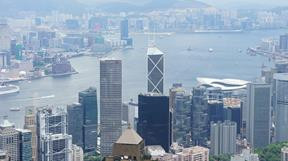Despite continuous transmission of the infection that has forced most competitor financial areas to live with the illness, Hong Kong is speeding up its reopening preparations, easing mask-wearing requirements, and allowing more recreational places to reopen.
People will no longer be required to use face masks while exercising outdoors as a result of the new regulations, which will enable beaches and swimming pools to resume on May 5.
On May 19, restaurants will be able to serve customers until midnight, while nightclubs will be able to stay in business until two in the morning, according to Chief Executive Carrie Lam.
After hitting a peak of over 50,000 cases in a horrific omicron wave that has become the world's deadliest outbreak earlier this year, infection rates are now in the low triple figures.
It also suggests that, despite continuing to support Beijing's COVID-19 Zero Plan, Hong Kong is pursuing a less dogmatic attitude to sustaining China's no-tolerance stance.
"I'm happy to report that we can progressively return to normal," Lam added. The swift easing will serve as a benchmark for the future CEO, possibly John Lee, who is the only current nominee for the position that Lam wants to leave on July 1 after the May 8 voting.
Citizens of Hong Kong have just recently begun to escape from limitations imposed during the Covid spike, which began at the beginning of the year.
After criticism from the mainland over the city's apparent inadequate implementation of outbreak controls, bars and several public events were ordered shuttered in January, and beaches were restricted in March.
Although the developments indicate that Hong Kong is nearing the exit of the COVID-19 tunnel, the city remains well behind regional competitors such as Singapore.
Other restrictions remain in place, particularly for newcomers and their quarantine procedures.
The city's economy was hurt hard by the restrictions in the first three months of the year. In February, retail sales decreased 14.6%, and exports fell 8.9% in March.
Economists estimate that Hong Kong's first-quarter gross domestic product will fall short of expectations, a first since the Asian banking agency's record two-year slump in 2020.
The attitude in Hong Kong contrasts with that in China, where Shanghai is in its fifth week under isolation, with thousands of cases recorded every day.
To control minor cases, Beijing and other mainland cities have implemented partial detentions or mass testing programs, with no relief until local transmission channels have been interrupted.





